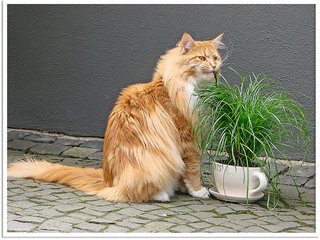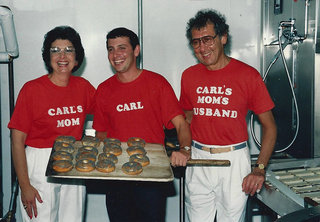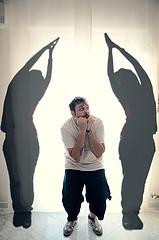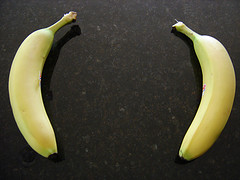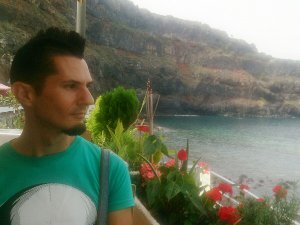 Peter: Carlos, please take a few sentences to introduce yourself in a professional context.
Peter: Carlos, please take a few sentences to introduce yourself in a professional context.Carlos: My father bought an Intel 8086 back in 1987, I was just six years old. He had several books with examples of source code in BASIC. That fascinating language got me hooked, I used to copy listings from the book to the computer to see the program run. That marvellous machine seemed to be the gate to the future, as it turned out to be... Years later I had an Amiga 500, then Amiga 1200 and was an active member of the Amiga community. Later I discovered Open Source and installed GNU/Linux on my machine back in 2000, it was Mandrake, then Debian...
When I was in my second year in college I sold my first program, it was a Delphi program to read data from files and render as graphs. With the local Debian community I volunteered as system administrator in several LAN parties, installing and monitoring servers. My first "official" job was as a PHP developer and Linux system administrator. My third job was my own company which made me grow as an individual. I started with three good friends and ended without company and without friends, but I learned a lot about myself and many other things.
Moving to Ireland was another milestone in my career, I went there without job and without a place to stay, spending a couple of weeks in a cheap hostel. I was over optimistic and did not really know how hard it is to start from scratch in a different country with a different spoken language. As you can imagine that was an awakening. That year in Dublin my brain learned to think in English and I learned that I could make a living as a developer anywhere. That gave me confidence to start up new projects when I moved back to home. I thought that if everything went wrong I could move abroad for good while this crazy bubble was still growing in Europe and the US.
What do you consider your biggest successes?
In the long term, the success lies in the perseverance. Working in many different places and learning from different people has helped me a lot. Writing a blog and self-publishing the first book on TDD in Spanish opened new doors. Sharing what you know and learning from others is essential. I have been using computers my whole life pretty much and I have been making a living out of it for about 15 years now. Today I run a successful company providing training and consulting as well as development services.
I know that you are vegetarian since more than ten years and I noticed you sharing content about cruelty to animals in factory farming. Why does that matter to you?
Once you know what happens in the factory farms and the slaughterhouses it is not very difficult to become vegan. Discovering the lies of the system is like taking the red pill in Matrix. I am slowly transitioning to a way of life that is sustainable for the planet. I do not want to take part in the animal holocaust. Most people do not know the truth about the system, the way the planet is dying so I feel like sharing what I know.
The reason to become vegan goes way beyond respect and empathy for animals. The carnist system (meat industry, consumers, etc.) is killing the planet at a dramatic rhythm:
- 51% of the greenhouse gas comes from the meat industry.
- 45% of the Earth's solid surface is used by the meat industry.
- 10.000 square metres of land may produce 27.600 kilograms of vegetables, however it only produces 280 kilograms of meat.
- Between 4.000 and 8.000 square metres of Amazon rain forest disappear every second, they are destroyed to grow grain for animals in the factory farms.
- Three quarter of animal life in the ocean has disappeared already, species like tuna are disappearing quickly.
- A single hamburger requires 3000 litres of water.
- 70.000 million of animals die every year for meat.
- Most of the food for animals is transgenic, which is killing the diversity of the vegetable species on the planet and giving even more power to large corporations like Monsanto.
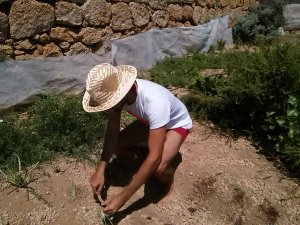 For references and more information about the numbers above I highly recommend the book Why we love dogs, eat pigs and wear cows by Melany Joy, it is an eye opener, a terrific book. Our ignorance is causing our own extinction but I believe we still can change it, I am very positive about it. I see more and more people aware of their consumer habits. Consumers have the power to change the world. I recommend the documentaries Cowspiracy and Home for those how want more numbers and facts.
For references and more information about the numbers above I highly recommend the book Why we love dogs, eat pigs and wear cows by Melany Joy, it is an eye opener, a terrific book. Our ignorance is causing our own extinction but I believe we still can change it, I am very positive about it. I see more and more people aware of their consumer habits. Consumers have the power to change the world. I recommend the documentaries Cowspiracy and Home for those how want more numbers and facts.What other topics are you concerned about and what do you actually do regarding these things?
I try to reduce my ecological footprint as much as I can, everyday a little step further towards a sustainable life which involves many areas, a lot of thing to learn and unlearn. We have been educated for competition but the current situation requires collaboration. So I want to be the change that I want to see in the world as Gandhi said, I am the first one who has to change in many respects. Every little gesture helps.
The easy way for us to change the world is by changing our consumer habits. Buy local food rather than going to a massive shopping centre. By organic food. Reduce the amount of animal products in your diet (you do not have to be vegan) and buy them directly from sources where you can see with your own eyes how the animals are treated. Help local producers first. Ask big corporations to be transparent when it comes to the way they produce their products. We need to know how things are made to make good decisions.
Make sure that cosmetics and cleaning products have not been tested on animals. There is no need for that at all. Laundry and dish-washing detergent as well as other cleaning products have a big impact in the nature, causing water pollution. Search for sustainable alternatives. Recently I have found a woman who makes soap in the traditional way and I am buying her soap and using it for the washing machine and dish-washing.
Do not buy stuff you do not really need, consider buying second hand. You do not need a new laptop every year or a new cell phone every six months. Do you have an idea on the ecological footprint caused by mobile devices? It is a good time to start wondering about these type of things. The way you spend your money has a direct impact on the life of the planet. Governments and large corporations are not taking care of the planet for us, we are the ones with the power to change. Your choices when you buy are way more important than your choices when you vote for a politician party. See the interesting documentary the story of the stuff for more details.
Outside your personal topics discussed above, what do you consider the biggest challenges of our times?
To survive our own ignorance, to stop living as if the resources of the planet were infinite.
What could we do to engage in these topics?
Whatever you do, it has to be fun or rewarding in some respect, otherwise it will not be sustainable and you will finally stop it. The transition movement is very inspiring, it is like a great promise and it is working in many places, e.g. agroecology, permaculture, de-growth, and so on. There are nice and cool things to get involved in, more than we think. I recommend the documentary In Transition.
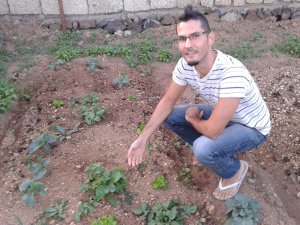 The less money you need the more freedom you get. I am starting to grow my own food at home, my plan is not to need money for food soon. I plan to instal clean energy at home so I am able to survive without money while my lifestyle is humble. The way we spend our money, the way we shop is more important and more powerful than we think. I am also limiting the number of flights per year, this explains why I am attending less conferences than usual.
The less money you need the more freedom you get. I am starting to grow my own food at home, my plan is not to need money for food soon. I plan to instal clean energy at home so I am able to survive without money while my lifestyle is humble. The way we spend our money, the way we shop is more important and more powerful than we think. I am also limiting the number of flights per year, this explains why I am attending less conferences than usual.Most of our time is spent on regular work and thus I want to see more impact of my work. While I could quit my job and do charity only, I would rather keep doing what I can do best and earn my salary as usual, just working on "the right things". Do you think that is possible in general?
Everyday at work we have an opportunity to be nice to others, help and support them with love. We do not have to quit our jobs or run charity organisations. We just have to be aware and consistent with our thoughts, our feelings and our words. Take a look at Radical Simplicity.
Do you have any examples where you took professional decisions based on your values and social responsibility?
I have been lucky not to work on projects or at companies that I consider deeply against my principles. I try to listen to my gut feeling. Sometimes I take a day off to disconnect and get some inspiration from nature.
How do you think about selecting customers and projects based on your values?
I try to know more about my customers before working with them. I do some research and if I do not like what I find or what I see during my first visit then I just do not work with them. As I said I have been lucky enough to stand in a position where I can say no to some jobs. I understand that not everybody can say this all the time.
Sometimes a company does not sound very good but it is still worth visiting it to see what they do and how they do it. There is always time to reject projects or customers. I try to avoid companies where everybody's goal is to make money. Money is a means and not a goal in itself.
Let's be more specific. Would you work for an animal factory? Would you work for a company producing equipment for animal factories?
I might visit some of those companies to meet people before saying no beforehand. The list of undesired industries or projects would be big man ;-) But yeah, I do not work for money, money is a secondary effect.
Did you ever reject a customer or an actual project based on your values?
When you leave a company, most of the times the reason is that you feel you have different values and principles, a different vision. Otherwise you stay. I do not want to write any company names in here.
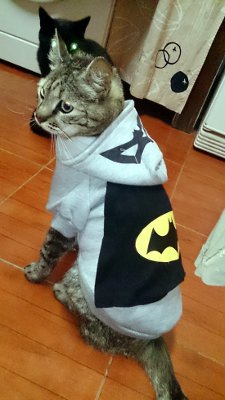 What would be customers and projects that you consider important and have an impact on society and the problems we discussed earlier?
What would be customers and projects that you consider important and have an impact on society and the problems we discussed earlier?As a software developer, your colleagues are the ones who make projects interesting and fun. People are the key. I recently saw that the guys from Avaaz were recruiting. They work for a better world and I signed many of their petitions, but I have enough years of experience not be enticed for their job offer because I do not know anyone working there, I do not know about their values as software developers.
Years ago I used to work as the "computer man for everything" in a little charity shop and I it was not nice at all because time and energy was spent discussing irrelevant stuff, fighting with egos, with no impact at all in the final goal. It is a romantic idea to think that a software project might have a positive impact on the world. Sometimes it does but in my experience the values and principles of the team are what really matter. I search for a combination of projects with less negative impact on the world, whose team members are people I know and who are aligned with my values and principles as a professional.
For example, one of my current customers is a car importer and dealer. The cars they sell need oil to run, they are just regular cars. It does not sound like a company that helps the planet. But I do have a gasoline car as well and so far I could not find a way to live without it. I try to minimise gasoline waste and hopefully someday I will not need the car or I will at least have a solar car. But it would be silly to say "I don’t want to work for a car company" while using a car myself. Moreover, the employees have a great sense of collaboration. People help one another in the office, the company really cares about the employees and people are happy working in that environment. I had the chance to meet the CEO several times for lunch and he has told me that they donate almost half a million Euro every year to local NGO's. I have shared my concern for the climate change and the peak oil with him. These guys have a lot of potential to change things for better so I see the job as an opportunity to help influential people awake awareness apart from growing myself as a professional.
I have been brief but if people read the answers and write comments or further questions I will go deeper into the subject, I just need some feedback to do so ;-)
Credits
Thank you Carlos for taking the time to answer my questions. This has become a long article but I believe it is worth it. I really enjoyed discussing these important topics with you and appreciate that you took the time to share. Thank you very much and I wish you all the best for your projects in the future.
